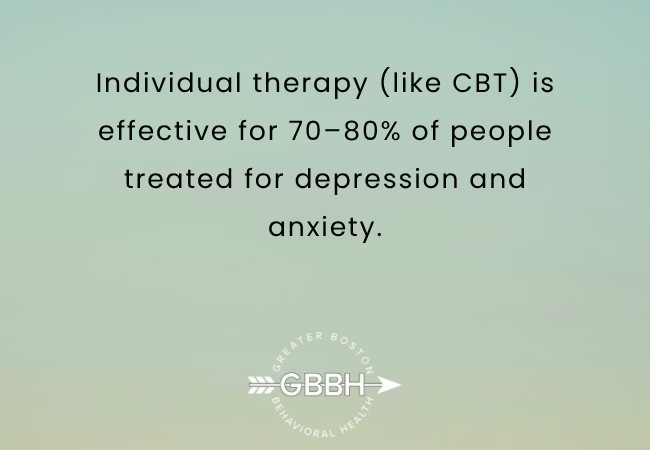Whether you’re coping with anxiety, depression, trauma, or a dual diagnosis, therapy is often the heart of any effective mental health program. At Greater Boston Behavioral Health, we use both individual and group therapy across our levels of care—including partial hospitalization programs (PHP) and intensive outpatient programs (IOP) in Massachusetts—to help clients address emotional pain, build coping skills, and create lasting change.
Each therapy type brings unique benefits—and together, they create a balanced, powerful treatment approach tailored to every person’s journey.
What Is Individual Therapy?
Individual therapy is a one-on-one session between you and a licensed therapist. These sessions provide a safe, confidential space to explore your thoughts, feelings, behaviors, and experiences. It’s about helping you better understand yourself and develop healthier ways to cope and grow.
Common methods used in individual therapy:
- Cognitive Behavioral Therapy (CBT)
- Dialectical Behavior Therapy (DBT)
- Psychodynamic therapy
- Mindfulness-based therapies
- Motivational Interviewing
- EMDR (Eye Movement Desensitization and Reprocessing) for trauma
Benefits of Individual Therapy:
- Personalized attention to your mental health needs
- Deep exploration of trauma, anxiety, depression, or anger
- Private setting to discuss sensitive topics
- Targeted strategies for emotional regulation
- Ongoing goal-setting and progress tracking
At our mental health treatment center in Massachusetts, individual therapy is integrated across all programs, from inpatient and residential care to IOP and PHP.
What Is Group Therapy?
Group therapy involves a therapist-led discussion with peers who share similar struggles. While some may feel hesitant about opening up in a group setting at first, many clients find it incredibly validating, healing, and empowering.
Group therapy types we offer:
- Process groups – exploring emotions and relationships
- Skills-based groups – DBT, CBT, anger management
- Psychoeducation groups – understanding diagnoses and coping mechanisms
- Support groups – mutual encouragement and real-life strategies
- Trauma-informed groups – safe spaces for healing past wounds
Benefits of Group Therapy:
- Peer support and shared understanding
- Reduction of isolation and shame
- New perspectives and feedback
- Improved communication and social skills
- Practice emotional regulation in real time
Group therapy is a core element of our partial hospitalization programs in Massachusetts and intensive outpatient programs, where daily or weekly sessions reinforce what’s explored individually.
How Group and Individual Therapy Work Together
Think of individual therapy as your internal work, and group therapy as your external practice. Together, they offer a full spectrum of emotional support.
In Combination, They Help You:
- Understand and manage mental health symptoms
- Build deeper insight into your thought patterns and triggers
- Learn new coping tools and apply them in social settings
- Process trauma while practicing healthy boundaries
- Gain accountability from both your therapist and your peers
This dual approach creates more effective outcomes, especially in structured programs like PHP and IOP.
Customizing Therapy for Specific Diagnoses
At Greater Boston Behavioral Health, therapy isn’t one-size-fits-all. Each program is tailored based on your diagnosis, goals, and strengths. For example:
For Anxiety:
-
Individual therapy focuses on identifying anxious thought patterns, exposure strategies, and building resilience.
-
Group therapy may include social anxiety support groups or CBT-based anxiety skills groups.
For Depression:
-
One-on-one therapy helps clients challenge negative beliefs and develop behavioral activation plans.
-
Groups offer connection, emotional processing, and validation to fight isolation.
For Trauma or PTSD:
-
Individual sessions may use EMDR, trauma-focused CBT, or somatic therapies.
-
Trauma groups focus on grounding techniques, shared experiences, and boundary setting.
For Anger Management:
-
Individual therapy identifies root causes of anger and teaches emotional regulation.
-
Group therapy provides real-time feedback, role-play, and accountability.
Whether you’re in a partial hospitalization program Massachusetts, IOP, or residential care, your therapy plan aligns with your diagnosis and long-term recovery vision.
How Therapy Evolves Across Levels of Care
Your needs change as you heal—and so does your therapy. Here’s how the structure evolves across levels:
| Level of Care | Individual Therapy | Group Therapy |
|---|---|---|
| Inpatient/Residential Treatment | Daily or several times per week | Daily psychoeducation, skills, and support groups |
| Partial Hospitalization Program (PHP) | 2–3 times weekly | Multiple groups daily (5–6 hours/day) |
| Intensive Outpatient Program (IOP) | Weekly | 3–5 groups per week |
| Outpatient Therapy | As needed (1–2x/week typical) | Optional weekly groups |
This step-down approach ensures continued progress while fostering independence and real-world application.
Continuity of Care: Seamless Support Beyond Therapy
We don’t just offer therapy—we offer a comprehensive system of support to make sure you thrive both in and out of sessions.
After Therapy Hours:
-
Case management helps coordinate services like housing, education, or employment.
-
Medication management ensures psychiatric care is integrated with your therapeutic progress.
-
Family sessions create alignment with loved ones and reduce relapse triggers at home.
-
Alumni programs and aftercare planning help you transition to independence with ongoing check-ins.
This holistic model is what sets our mental health treatment center in Massachusetts apart—providing not just healing, but sustained empowerment.
Therapy in Action: Across Our Programs
Residential Treatment Programs in Massachusetts
- Daily individual therapy for stabilization and emotional safety
- Group therapy for social connection and structured support
- Ideal for those in acute distress or experiencing mental health crises
Partial Hospitalization Program Massachusetts
- 5–6 hours per day of structured care
- Daily group therapy + 1–2 individual sessions per week
- Intensive yet non-residential program for significant support
Intensive Outpatient Program Massachusetts
- 3–5 days/week, flexible schedule
- Frequent group sessions + weekly individual therapy
- Great for step-down care or those managing work/school responsibilities
Anger Management Therapy Massachusetts
- Targeted groups focused on triggers, accountability, and emotional regulation
- Integrated into PHP, IOP, or outpatient care depending on need
No matter the level of care, our mental therapy programs in Massachusetts emphasize flexibility, safety, and client-centered progress.
The Evidence Behind Therapy-Driven Care
According to the American Psychological Association, people in evidence-based therapy experience 60% to 80% improvement in emotional health after just 8–12 sessions. Furthermore, programs combining individual and group therapy show significantly higher retention and satisfaction rates.
These stats underscore the power of using both therapy types in tandem to support deep and lasting mental wellness.
Real-Life Transformation
Many of our clients report that individual therapy gave them a space to feel truly heard for the first time, while group therapy gave them the confidence to reconnect with others. Together, these approaches help people:
- Break long-held patterns
- Build self-worth
- Strengthen relationships
- Maintain lasting emotional balance
Why Choose Greater Boston Behavioral Health?
As a trusted mental health treatment center in Massachusetts, we specialize in tailored, evidence-based care that includes both individual and group therapy at every stage. Here’s why clients choose us:
- Individualized treatment plans
- Trauma-informed therapists and DBT-trained clinicians
- Full continuum of care (inpatient, PHP, IOP, outpatient)
- Flexible scheduling for real-life balance
- Compassionate, culturally competent care
Whether you’re dealing with anxiety, depression, trauma, or relationship struggles, our mental health programs in Massachusetts are here to help.
Conclusion
Whether you’re navigating anxiety, depression, trauma, or emotional instability, true mental wellness requires both internal insight and external support. That’s why at Greater Boston Behavioral Health, we combine the power of individual therapy and the connection of group therapy across every level of care—from partial hospitalization and IOP to residential and outpatient programs.
Individual sessions help you understand yourself. Group sessions help you relate to the world around you. Together, they give you the tools, clarity, and confidence to build a more stable, fulfilling life. Ready to begin? Call 888.278.0716 today to learn more about how our integrated therapy approach can help you heal and grow. You don’t have to choose between being heard and being supported—you deserve both. And we’re here to provide it.
FAQ on Mental Health and Therapy
What’s the difference between group and individual therapy?
Individual therapy is one-on-one with a therapist, focusing on personal goals and challenges. Group therapy involves guided discussions with peers and promotes shared learning, support, and communication skills.
Do I need both types of therapy for recovery?
Often, yes. Most mental health programs, especially PHP and IOP in Massachusetts, combine both to give you private space to heal and social tools to grow. It’s a powerful combination for sustained progress.
What issues are best treated in individual therapy?
Deep-seated trauma, anxiety, depression, self-esteem issues, and personal triggers are often addressed most effectively in one-on-one settings, especially early in treatment.
How does group therapy help with mental health?
Group therapy offers peer connection, feedback, real-world social practice, and emotional validation—particularly helpful for issues like social anxiety, anger management, or PTSD.
Are therapy sessions confidential?
Yes. Individual sessions are fully confidential, and group therapy follows strict confidentiality agreements to ensure a safe and respectful space for all participants.
What kinds of therapy are used at Greater Boston Behavioral Health?
We offer CBT, DBT, EMDR, mindfulness therapy, anger management therapy, and trauma-informed care—all integrated into our Mental Health Programs in Massachusetts, including PHP and IOP.


